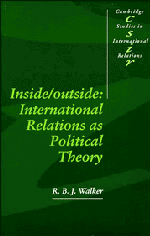Book contents
- Frontmatter
- Contents
- Preface
- 1 International relations as political theory
- 2 The Prince and ‘the pauper’
- 3 Ethics, modernity, community
- 4 History, structure, reification
- 5 Realism and change
- 6 The territorial state and the theme of Gulliver
- 7 On the spatio-temporal conditions of democratic practice
- 8 Sovereign identities and the politics of forgetting
- Notes
- Bibliography
- Index
8 - Sovereign identities and the politics of forgetting
Published online by Cambridge University Press: 05 July 2011
- Frontmatter
- Contents
- Preface
- 1 International relations as political theory
- 2 The Prince and ‘the pauper’
- 3 Ethics, modernity, community
- 4 History, structure, reification
- 5 Realism and change
- 6 The territorial state and the theme of Gulliver
- 7 On the spatio-temporal conditions of democratic practice
- 8 Sovereign identities and the politics of forgetting
- Notes
- Bibliography
- Index
Summary
Sovereignty and repetition
The careless embrace of acute ontological antagonisms in the deceptively simple name of political realism. The attempt to fix origins in texts that problematise all origins. The insistence that something called ethics be inserted into politics at an intersection that is already constituted as the paradigm of modern political ethics. The disciplining of scholarly procedures by constant appeals to epistemological privilege. Oscillations and continuities informed by pervasive spatial metaphors. Typologies translating horizontal territorialities into apparently hierarchical levels. Articulations of cosmopolitan aspiration for principles that celebrate the virtues of particularity. Such strategies, I have argued, delineate some of the distinctive limits of modern political discourse in an era perplexed by temporal accelerations and historical/structural transformations. These limits are especially apparent in the categories and debates of international relations theory as the discipline most explicitly constituted as a limit of authentically political life within the territorial container of the sovereign state.
To read theories of international relations in this manner, I have also suggested, is to understand them less as an explanation of contemporary world politics than as an expression of processes they are claimed to explain. As such, I have sought to interrogate the assumptions, reifications and textual strategies of international relations theory not because I hope to contribute to a better explanatory theory, at least not one about international relations, but in order to problematise theoretical and practical horizons that continue to be taken for granted.
- Type
- Chapter
- Information
- Inside/OutsideInternational Relations as Political Theory, pp. 159 - 183Publisher: Cambridge University PressPrint publication year: 1992

